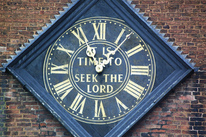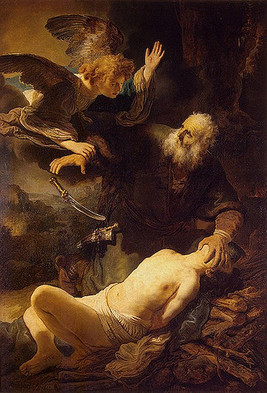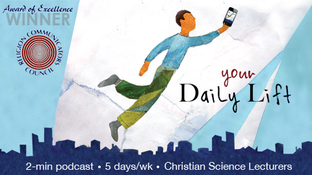|
10/31/2012 Punctuality and prayer A teacher once told her class, "If you arrive early, you are wasting your time. If you arrive late, you are wasting my time." I worked hard every day of her class to arrive exactly on time. And it was a struggle! Some excuse arose each day for tardiness. The alarm clock didn't go off and I overslept. The car wouldn't start. The traffic was heavier than usual. The etcetras went on for the duration. But I was committed to get there not only on time, but exactly on time, each day. So consequently, "come hell or high water" (and I faced both), I was there on time. Little did I know, but I was actually learning something about the fundamental law of punctuality, a spiritual attribute of the omniscient and omniactive Mind that is God. The divine law of punctuality is that divine Good is everpresent and eternally engaged. It is never a second too early or a moment too late.  And here is how the law of punctuality relates to prayer. Imagine someone calls and asks you for help. Except for the law of punctuality, you might think that you have to search for an inspiration from 10 days ago, 10 hours ago or even 10 minutes ago, in order to respond to the need in your prayers. But no! You don't have to waste time in the search. Inspiration does not arrive too early to be immediately accessible. God's thoughts, his angels, are punctual. Where you are at the moment in your prayer is exactly where you need to be to help and heal. Opening your eyes and your heart to the angel of the moment will give you the comforting words and the powerful healing thoughts to meet the need in that very instant. Now, imagine again that someone calls and asks you for help. Except for the law of punctuality, you might think that you have been so busy with other things that you aren't prepared, that your mental and spiritual cupboard is bare, and that you have to invest some time into getting ready to pray. But no! You don't have to make that dear one wait for the help that is right at hand. God's thoughts, his angels, are always here according to the divine law of punctuality. Mind knows no lapse in goodness - not yours, and not the caller's. It isn't what a mortal, limited thinker knows; it is what God, the perfect Mind, knows that counts. You can turn instantly to this Mind, your God, to give you the perfect and precise thought that lifts you and the patient out of the doubt, fear and turmoil of the case. You can be precise and on point in your prayers because you reflect the divine law of punctuality. You don't need time to search for ideas. You don't need time to wait for ideas. Mind and His best ideas are right on time and always at hand. Did this get you thinking? Please share it!
And for a full-text version delivered to your email inbox, you can find the subscription box in the sidebar. You may also wish to: VISIT MY WEBSITE HOME PAGE FIND LINKS TO MY OTHER PUBLISHED CONTENT 10/26/2012 Eid al-Adha: And Abraham lifted up his eyes Eid al-Adha is an important three-day religious holiday celebrated by Muslims, beginning today. The holiday honors the willingness of the prophet Abraham to sacrifice his son as an act of submission to God, and the son's willingness to be sacrificed, until God sent a ram instead. According to Christian and Jewish tradition, Isaac was the son involved. For the Muslims, tradition teaches that the child was the first-born, Ishmael. For a long time this story has troubled me. What kind of God tests the love of his creation by asking such a cruel thing of a father? And what kind of a father goes along willingly with the idea of sacrificing his child? Was it blind faith? Was it a symbolic request? Was it a religious delusion? Or did Abraham know something that the witnesses and story tellers didn't? By the time this incident occurred, Abraham already had a longstanding relationship with God. He talked with God as naturally as a son to a human father. And when the Father spoke, Abraham was always ready with the response, "Here am I!" That is - Here I am, ready and willing to put full confidence in my God.  And this is where the story begins. In the King James version of the text, God told Abraham, "Take now thy son, thine only son Isaac, whom thou lovest, and get thee into the land of Moriah; and offer him there for a burnt offering upon one of the mountains which I will tell thee of." And we are told that "Abraham rose up early in the morning, and saddled his ass, and took two of his young men with him, and Isaac his son, and clave the wood for the burnt offering, and rose up, and went unto the place of which God had told him." Here is where the story gets interesting. "Then on the third day Abraham lifted up his eyes, and saw the place afar off." What did Abraham see afar off? A place of impending human sacrifice? The place where a murder would be committed in God's name? What was the "place afar off" that Abraham saw then and there? One thing is for sure: He moved forward with confidence and no fear. He said to his companions, "Abide ye here with the ass; and I and the lad will go yonder and worship, and come again to you."  Was Abraham a liar? Did he consider killing his son to be an act of worship? Or is it possible that he knew something was about to happen that the witnesses didn't know? Abraham did go forward to the appointed place, exactly as God commanded. Laying wood on Isaac's back and taking his knife, father and son went together. And when Isaac questioned his father as to the whereabouts of the lamb for sacrifice, Abraham replied, "God will provide himself a lamb." This leads me again to ask, was Abraham a liar? Was he hiding the truth from his son? or did he know his Father, his God, to be Life - the divine Life that gives and sustains life eternally, and could not, would not take it away? The scene plays out quite dramatically. "And they came to the place which God had told him of; and Abraham built an altar there, and laid the wood in order, and bound Isaac his son, and laid him on the altar upon the wood. And Abraham stretched forth his hand, and took the knife to slay his son." At this point an angel appeared and called to Abraham. He replied, "Here am I." And the angel said, "Lay not thine hand upon the lad, neither do thou any thing unto him: for now I know that thou fearest God, seeing thou hast not withheld thy son, thine only son from me." Abraham, again, lifted up his eyes. He saw a ram caught in a thicket, and this ram was offered for a burnt offering. And he named the place Jehovahjireh: which means, In the mount of the LORD it shall be seen.  What did Abraham see that could give him such confidence as he entered the land of Moriah? What did he know that allowed him to reassure his travel companions and son that all was, in fact, well? Remember, Abraham told the companions, "I and the lad will go yonder and worship, and come again to you." "I and my son will... come again to you." He said they would both come back. Did you catch that? I only recently did. Abraham knew they would both come back. He told the truth. What do you think Abraham saw when he lifted up his eyes? What was the it to be seen in Jehovahjireh? Wishing all my Muslim friends and family the blessings of Eid al-Adha. "Abraham. Fidelity; faith in the divine Life and in the eternal Principle of being." Science and Health with Key to the Scriptures, by Mary Baker Eddy Did this get you thinking? Please share it!
For a full-text version delivered to your email inbox, you can find the subscription box in the sidebar. You may also wish to: VISIT MY WEBSITE HOME PAGE FIND LINKS TO MY OTHER PUBLISHED CONTENT 10/24/2012 How do I love me? A blog reader (and patient) who will remain anonymous has been encouraging me to write a post on the importance of loving oneself. A couple of days ago, she wrote me an email explaining how important this concept has been to her in recent days. I asked if she was willing for her thoughts to be shared on the blog. Her reply? "Of course." So here you go! From an email dated Saturday, October 20, 2012: The injunction "Love thy neighbor as thyself" has been popping into my mind for the last few days, and I’ve been giving it a lot of thought. I think most of us would find it not too hard - at least in most cases—to maybe not love, but at least like our neighbor. But us? Love ourselves? Even like ourselves? No way!  Once I asked a dear friend if she loved herself and she looked me in the eye and said, “I don’t even know what that means.” And she was love itself, a church-goer, generous to a fault, devoting all her time to helping others. How could she not know what that meant? I think lots of people would throw up their hands in horror if asked the same question. Yet all through the Bible, the subject is God’s great love for us. So I was asking myself, what's wrong? In the Bible there is a lot of talk about self-abnegation, self-sacrifice, and selfless love. Also, original sin. And to me, it’s this notion that we are basically sinners and worthless, therefore unworthy of love, that seems to have gotten the upper hand. So the idea of loving oneself has become twisted into being irrelevant or into seeming like an ego trip of self-absorption or self-indulgence, to be rejected entirely by anyone seeking salvation. And then appears the natural extension of this neglecting to love oneself - self-hatred. I think we have the wrong idea of love and of Love. And it is a better understanding of Love, of God as an unchanging Principle, teaching us to love even ourselves, that makes Christian Science revolutionary.  In Retrospection and Introspection, Mary Baker Eddy writes, “Art thou unacquainted with thyself? Then be introduced to this self. Know thyself!” Over these past several days when you have been working for me, I have begun to understand that knowing myself has to do with loving myself. That is, to know myself, and love my real self, I must see myself as Love sees me. And “love is patent, love is kind.” So a healing has come. I can see that because God says I am loved and loveable, it’s being said and done and can’t be contradicted. I can yield, accept. Understanding this has overturned all the bad I’d been told about myself ever since I was little. And the baseless anger that had been eating at me for several months has just dissolved. I have become more patient and kind. I have totally quit bashing myself for anything and everything. And I have decided to love no matter what. Me. Others. Often expressed in just a smile, or even merely a pleasant expression. And in return I’ve had such blessings. Love it? Please share it!
For a full-text version delivered to your email inbox, you can find the subscription box in the sidebar. You may also wish to: VISIT MY WEBSITE HOME PAGE FIND LINKS TO MY OTHER PUBLISHED CONTENT 10/17/2012 Pearls, swine and judgment Are there people in your life who are not worth the time of day? Some who just don't deserve to be loved, prayed for, given a helping hand? That is how Christ Jesus' words about throwing one's "pearls before swine" are sometimes interpreted. According to Matthew, his exact words are: "Do not give what is holy to dogs, and do not throw your pearls before swine, or they will trample them under their feet, and turn and tear you to pieces." Matthew 7:6, New American Standard Bible So who or what are the swine? In the Bible, context means a lot. Jesus' remarks appear in Matthew's rendering of the Sermon on the Mount and is part of a general discussion on not judging others. His basic message is: "Don't judge others, rather work on your own perspective so you can help." And he finishes with the swine reference. Did Jesus suddenly switch gears? Maybe not.  In Science and Health with Key to the Scriptures, Mary Baker Eddy wrote, "Jesus' parable of 'the sower' shows the care our Master took not to impart to dull ears and gross hearts the spiritual teachings which dulness and grossness could not accept. Reading the thoughts of the people, he said: "Give not that which is holy unto the dogs, neither cast ye your pearls before swine." (p. 272) Is the phrase "dull ears and gross hearts" a reference to ignorant or unreceptive neighbors, colleagues, family members and other people? Or is it possible the dull ears, gross hearts, and swine, are actually the mortal thoughts and material conditions that tend to pull our attention away from seeing, loving and helping our fellow man? By the time Jesus met a certain man from Gadera, the guy had already been subject to a lot of "pearls before swine" treatment. His closest neighbors were swine-herders who had invested a lot in watching this poor man suffer and act out. They were aware of up to a legion (2000) of symptoms of his illness. How difficult it must have been for them to be so invested in the man's difficulties. Ultimately, they they paid a high price for their proximity to his case. (For a full look at that story and its meaning, see "What we can learn from that crazy pig story".)  On the other hand, Jesus didn't suffer at all for helping. He had a different approach. He didn't ask about the problem, didn't get involved with all those symptoms. The contact was short and sweet, really. But effective. He asked the man his name. Christ Jesus saw him as a man with a name and a spiritual nature to be discerned and loved. Whatever was said, no matter what tale of suffering poured out, he didn't carry on a lengthy discussion with the devils - the symptoms of disease. He cast them out. Seeing him as the son of God, Jesus helped the man find himself again, clothed and in his right mind. Mary Baker Eddy explained how: "Jesus beheld in Science the perfect man, who appeared to him where sinning mortal man appears to mortals. In this perfect man the Saviour saw God’s own likeness, and this correct view of man healed the sick." (Science and Health, 476) Perspective is everything when it comes to helping and healing. This is why Jesus gave the essential teaching to his disciples just before talking about what they should not do with their pearls, "Why do you look at the speck that is in your brother’s eye, but do not notice the log that is in your own eye? Or how can you say to your brother, ‘Let me take the speck out of your eye,’ and behold, the log is in your own eye? You hypocrite, first take the log out of your own eye, and then you will see clearly to take the speck out of your brother’s eye." (Matthew 7:3-5, New American Standard Bible)  Many who need help don't know much more than that they are suffering. For those who know of a way out, there is always something that can be done. If the way isn't readily seen, we have a log in our eye - a mistaken view of the situation before us - and may well be fooled by the swine costume of symptoms that is hiding the real man. In that case, the need is to deal first with our own perspective in prayer. When we behold the perfect man, the true spiritual nature of man as the reflection of the perfect Mind that is God, we will always know what to do next. Whether we pray, or give a helping hand in some other way, there are always precious pearls we can throw. There really is no Christian way around it. We must throw down our pearls. Do we cast them before swine and risk their being trampled under a torrent of fear and frenzy? Or shall we place them before the Christ and see the real man as he is? The pure perspective of God's spiritual man, heals. And every one of your pearls counts. This post first appeared on this blog on March 13th. It has been edited and updated for this re-post. Things are settling down a bit around here. So, I expect to begin posting some new material in the next few days. It has been fun looking back over the last year and pulling forward some of my favorite archive pieces. Thank you for hanging in there and reading them again! Love it? Please share it!
For a full-text version delivered to your email inbox, you can find the subscription box in the sidebar. You may also wish to: VISIT MY WEBSITE HOME PAGE FIND LINKS TO MY OTHER PUBLISHED CONTENT 10/13/2012 It's not too late to stop this disease Feeling cornered by disease? Is doubt or fear wearing away your confidence in being healthy again? Take a lesson from Isaiah's playbook. Called by Hezekiah when an enemy army was advancing with the intent to decimate his city, Isaiah prayed a prayer so significant, so powerful, that it merited two accounts in separate books of the Bible - II Kings and Isaiah - and with results so effective that they received a third mention in II Chronicles, chapter 32. Isaiah's prayer stopped the deadly enemy cold, thundering to its finale: "Therefore thus saith the Lord concerning the king of Assyria, He shall not come into this city, nor shoot an arrow there, nor come before it with shield, nor cast a bank against it. By the way that he came, by the same shall he return, and shall not come into this city, saith the Lord. For I will defend this city, to save it, for mine own sake, and for my servant David's sake." (II Kings 19:32-34, Isaiah 37:33-35) Let me break this down. In its spiritual signification, "the king of Assyria" represents any thought or condition that bullies or threatens to wipe us out. In his conclusion, Isaiah explains, point by point, the power of divine Love to protect us against four specific tactics of this enemy. It shall not:
 Well before any actual battle, Hezekiah faced aggressive threats from the enemy. The king of Assyria sent a messenger to announce his plans to destroy the city. The intent was, of course, to undermine Hezekiah's confidence and increase his fear. Hezekiah was afraid and felt defeated long before any actual fighting. So when Isaiah came to his side and declared that God wouldn't allow it - that evil would not, could not enter and take the city - his message was like a good rain to thirsty soil. The results were immediately evident. And graphic. "And it came to pass that night, that the angel of the Lord went out, and smote in the camp of the Assyrians an hundred fourscore and five thousand: and when they arose early in the morning, behold, they were all dead corpses." An undeniably effective outcome.  I learned about Isaiah's prayer when I was suffering from a case of pneumonia that was taking me down fast. I felt both invaded and pervaded by disease. The fact that I had been praying for healing for a considerable time, and yet the symptoms worsened, was eating away at my spiritual resolve. I didn't understand this resistance to healing and the persistence of my suffering. When I came across Isaiah's prayer, it almost seemed to arrive too late. The disease had already gotten in. The enemy was well entrenched. Or so I thought. The following explanations from pages 426 and 427 of Mary Baker Eddy's Science and Health with Key to the Scriptures, helped me identify the real nature of the enemy. They helped me understand how to apply Isaiah's prayer to my case. Eddy wrote, "When it is learned that disease cannot destroy life, and that mortals are not saved from sin or sickness by death, this understanding will quicken into newness of life. It will master either a desire to die or a dread of the grave, and thus destroy the great fear that besets mortal existence... [Emphasis added] "The human concepts named matter, death, disease, sickness, and sin are all that can be destroyed... "Death is but another phase of the dream that existence can be material. Nothing can interfere with the harmony of being nor end the existence of man in Science."  I realized that the disease symptoms were nothing more than the messages being sent ahead by the enemy, trying to intimidate me and wear down my confidence in God and my spiritual resolve. Neither my body, nor pneumonia were the enemy. Even death wasn't the actual enemy because it would eventually be proved that man doesn't live or die in matter. No. The enemy bearing down on me was the fear of death. And I could do something about that. It wasn't too late to work with Isaiah's prayer. Here is a look into some of my reasoning.
 As Isaiah saw regarding Hezekiah's enemy, so it was for mine. "By the way that he came" (from the nowhere of fear) "by the same shall he return" (to the nothingness of fear). The pneumonia was stopped dead in its tracks. The black cloud of fear that had threatened me with aggressive symptoms dissipated completely. I was well. Don't be fooled into fighting an unreal enemy. The culprit is not disease. Your body doesn't hate you.The great enemy is always fear. It's never too late - NEVER TOO LATE - to stop fear and disease cold. This is an edited repost of an article that originally appeared on this blog on February 20, 2012. 10/9/2012 Slab time! A new, fun Daily Lift is available for listening and viewing. I am not the artist, but I sure was delighted to find that the producers decided to illustrate the message. And I must say, my cat is extra puffed-out pleased with herself this morning, now that she has her own cartoon. She is such a star. 5be sure to watch after the credits for the final surprise. Find the Daily Lift for 9/9/12 in English, and in French. If you find this post interesting or helpful, please share it!
Also, it is quite easy to subscribe to the blog if you would enjoy receiving updates. Simply put your email address in the box provided in the righthand column and click "Subscribe me!" You may also wish to: VISIT MY WEBSITE HOME PAGE FIND A LIST OF MY OTHER PUBLISHED CONTENT  Passion. Whether it is for a special person, a valued project or a life goal – who doesn’t adore that feeling of heightened purpose and breathless, eager anticipation that we call passion? I am not talking about a mere physical reaction or emotional bond. Passion, in its spiritual sense, is the fire of inspiration and pure love for its subject. Many go to great lengths to find something to be truly passionate about. When they do, they hope to sustain the feeling as long as possible. But when the initial fire dies down into embers, does this mean that the love and inspiration is coming to an end? Is there something we can do to fan the flame and rekindle the ardor of inspired commitment to that something or someone we love? In a long relationship between individuals, in a career or with organizations, duty or responsibilty can tend to take the place of joy and spontaneity; and inspired thinking and acting can suffocate under the daily grind. In this case, what we may have once fiercely loved can tend to become a trial of patience and a test of endurance. The Bible offers some insight into what happens when fresh thought fades into habitual patterns of thinking and acting. The apostle John delivered a message from the Revelator - from Jesus Christ - to a church in Ephesus, Greece that had fallen victim to daily routine. He warned: “I know thy works, and thy labor, and thy patience, and thou hast… borne and hast not fainted. Nevertheless I have somewhat against thee, because thou hast left thy first love.” (Revelation 2:2-4)  The way I see it, the Revelator commends the fact that they are hanging in there and plugging along. But what happened to the passion of their first love, the fervor for their purpose in laboring, working together? Kindly, John doesn’t leave them to flounder under this diagnosis. He also delivers some sage advice. He says, “Remember therefore from whence thou art fallen, and repent, and do the first works.” (Revelation 2:5) Here, passion is linked to vision, a spiritual vision involving inspiration. When we recapture the inspiration that initiated or spurred on a good idea or relationship, we have reconnected with the flame – the first love that restores joy and purpose. When actions spring from renewed vision, they act like a fan drawing on a spark until the full blaze is restored. Find inspiration and you find a reason for being. Express the inspiration by doing the “first works” - approaching the relationship with a virgin attitude ("Fresh; new; unused; as virgin soil" - Webster's 1828 Revised Unabridged Dictionary) and the fire tends to spread to those around you. During the first decade of marriage, my husband and I fell comfortably and naturally into the routine of work and family responsibilities. We had a sweet, loving relationship with mostly ups and very few downs. However, as steady and generally smooth as things were, we were still two people evolving at our own pace, with interests and activities that sometimes converged and often diverged. To a certain extent, we had let our relationship become a bit dusty. Nearing our tenth anniversary, I was longing to rediscover the fire of purpose in the relationship.  This wasn’t something I felt I could discuss with my husband. I didn’t know if he was feeling as out of sorts as I was. I certainly didn’t want to hurt him or frighten him by exposing my thoughts too soon. So before I brought anything to his attention, I decided to pray about my marriage – and to pray for my marriage. I had always felt our relationship was a gift from God, so it seemed perfectly normal to take my questions up in prayer. Ours was a marriage formed in prayer. I had been praying daily to see the qualities of God expressed in a life-companion. When I met my husband, I recognized his divine qualities right away. After the marriage and over time, regular, consistent prayer for the marriage dropped off and was replaced by the general day-to-day business of the family. And the vision? The inspiration? The fire and passion? That, too, had slowly faded out as the relationship was more and more deprived of that element of prayer so essential to its formation. So the Revalator's advice to that Ephesus church was on the mark for me. I rediscovered my “first love” through doing the “first works” – practicing again the consistent prayer that had brought us together in the beginning. One of my issues with the marriage concerned the subject of spirituality. This was clearly a big part of my life. For him? Not so much. I was the church goer, he worked on Sundays. I was spiritually hungry - a genuine seeker. He seemed to have no spiritual curiosity whatsoever. So I asked God in prayer, “After ten years together, are we really on completely different life paths? Is there anything that we can do to bring these two different tracks together?”  As I did some spiritual study on the subject of marriage, I came across a statement that provoked me to wake-up. It is in Mary Baker Eddy’s Science and Health with Key to the Scriptures – a book that really brings the Bible’s message to life. On page 90, she writes, “The admission to one's self that man is God's own likeness sets man free to master the infinite idea.” I had been thinking that if only my husband would change, or admit to himself that he was spiritual, we could rediscover our bond. Now I realized it didn’t depend on him at all. He wasn’t the one thinking he wasn’t very spiritual. That was my issue. I saw that if I admitted to myself that my husband was God’s own likeness, this would set us both free to master the infinite possibilities of our marriage. I took up daily prayer to watch for, and be a witness to, my husband’s spirituality, and I began to notice so many of his spiritual qualities. Marriage, to me, became a full-on commitment to witnessing to the best in each another. My sense of marriage was reborn. I discovered that the passion I had been seeking was present in direct proportion to my prayers and spiritual witnessing. Our life together was once again full of joy and inspiration. I never said a word to him about this prayer and spiritual renewal, because my struggles on the subject were between me and God. But he noted that the marriage was better than ever, and he was right. Prayer isn’t just last minute emergency life-support. Prayer can be a permanent life-link to a passionate expression of Life, God. If you are looking for more passion in your life, for renewal of commitment, and fresh joy in your familly, your work, your church, I highly recommend a regimen of prayer that opens you to see more of the divine expressed in and around you. The admission to yourself that you and those in your midst are God’s own likeness, can set you free to live a truly inspired life – aflame with divine Love. This post first appeared on this blog under the title "Aflame with Divine Love" on November 2, 2011. It has been revised and new links have been added. If you find this post interesting or helpful, please share it!
Also, it is quite easy to subscribe to the blog if you would enjoy receiving updates. Simply put your email address in the box provided in the righthand column and click "Subscribe me!" You may also wish to: VISIT MY WEBSITE HOME PAGE FIND A LIST OF MY OTHER PUBLISHED CONTENT 10/3/2012 The power of consent What is the common line to be crossed between hope and the achievement of some goal? Very often there is a need to give consent. Notice, I didn't write "get the consent of others". The front line in the battle for progress is always within the precincts of our own inspired thought. "The devotion of thought to an honest achievement makes the achievement possible," says Science and Health with Key to the Scriptures. (Mary Baker Eddy, p.199) To consent is to permit, approve, agree, comply or yield. Forward movement on a project, a relationship, a career move, or any other subject, often involves a bit of all five... 1. To Permit - By allowing yourself to find a reason for your hope, you open the door to the divine influence, and the unrestricted power of good to move you forward. Human approval can't do for you what aligning your motives and actions with divine Good can do. The power of God, universal Good, is always on the side of spiritual good. To divine Good, there is no opposition. "Is there no divine permission to conquer discord of every kind with harmony, with Truth and Love?" (ibid.p. 394)  2. To Approve - Do you tend to look to those around you for approval before gaining the confidence to advance with a good idea? Look higher. All true good - from a thought to a thing - reflects the attributes of divine Good in qualities. Examine your project to seek out the reflected qualities of God. Keep the divine Source of all true good in view. As we read in Paul's letter to Timothy: "Study and be eager and do your utmost to present yourself to God approved, a workman who has no cause to be ashamed ..." (II Timothy 2:15) I love the words of this hymn: "His goodness stands approved, Unchanged from day to day: I drop my burden at His feet, And bear a song away." (Christian Science Hymnal, 124) 3.To Agree - Agreement isn't about conforming to a limited human perspective. Agree to the highest and broadest expectation of good. Agree to express wisdom, intelligence, courage, tact, confidence, patience and unwavering persistence. These are divine attributes that everyone reflects as spiritual qualities. Notice them in yourself. Agree that you possess them. Agree that you can express them. Agree. "The admission to one's self that man is God's own likeness sets man free to master the infinite idea." (Science and Health, 90:24) 4. To Comply - Spiritual compliance doesn't involve subverting will or crushing your desires, but rather molding personal will and all desire to the divine. "Desire is prayer," we read in Science and Health, "and no loss can occur from trusting God with our desires, that they may be moulded and exalted before they take form in words and in deeds." (p. 1) In his letter to the Romans, Paul puts it this way, "Be not conformed to this world: but be ye transformed by the renewing of your mind, that ye may prove what is that good, and acceptable, and perfect, will of God." A paraphrase of Paul's words in The Message (Eugene Peterson) is also helpful: "Don't become so well-adjusted to your culture that you fit into it without even thinking. Instead, fix your attention on God. You'll be changed from the inside out. Readily recognize what he wants from you, and quickly respond to it. Unlike the culture around you, always dragging you down to its level of immaturity, God brings the best out of you, develops well-formed maturity in you." (Romans 12:2)  5. To Yield - One of my favorite thoughts on yielding is found in Genesis where God said, "Let the earth bring forth grass, the herb yielding seed, and the fruit tree yielding fruit after his kind, whose seed is in itself, upon the earth: and it was so." (Genesis 1:11). I often think of the 'herb yielding seed" as the "herb-yielding seed" and the "tree yielding fruit" as the "tree-yielding fruit." In other words - to yield, is to consent to the infinite fruit contained in every seed. I once heard, "Anyone can count the seeds in an apple, but only God can count the apples in the seed." Every seed, every inspired good thought is fueled with divine potential. There are no limits to what you are and to what you can do. Yield to your full potential. Accept the potential AND the fruit of your good ideas. You are a tree-bearing fruit! This post originally appeared on this blog on October 24, 2011. This slightly edited repost includes new links. If you find this post interesting or helpful, please share it!
Also, it is quite easy to subscribe to the blog if you would enjoy receiving updates. Simply put your email address in the box provided in the righthand column and click "Subscribe me!" You may also wish to: VISIT MY WEBSITE HOME PAGE FIND A LIST OF MY OTHER PUBLISHED CONTENT |

Find me on YouTube
I have practiced Christian Science professionally in some form since 1979. But my journey with Christian Science started in a Sunday school where as a young child I was taught the Scriptures and some simple basics of Jesus' method of scientific Christian healing. A significant experience at the age of twelve opened my eyes to the great potential of this practice. After impaling my foot on a nail, I prayed the way I had learned in Sunday school. Within moments the pain stopped and healing began. By the next morning the wound had disappeared completely. Having experienced the great potential of Christian Science, there would be no turning back. |
INFORMATION |
SERVICES |
HELP |
© 2011-2024 Michelle Boccanfuso Nanouche, CSB. All rights reserved. Pages updated February 6, 2024.

 RSS Feed
RSS Feed
